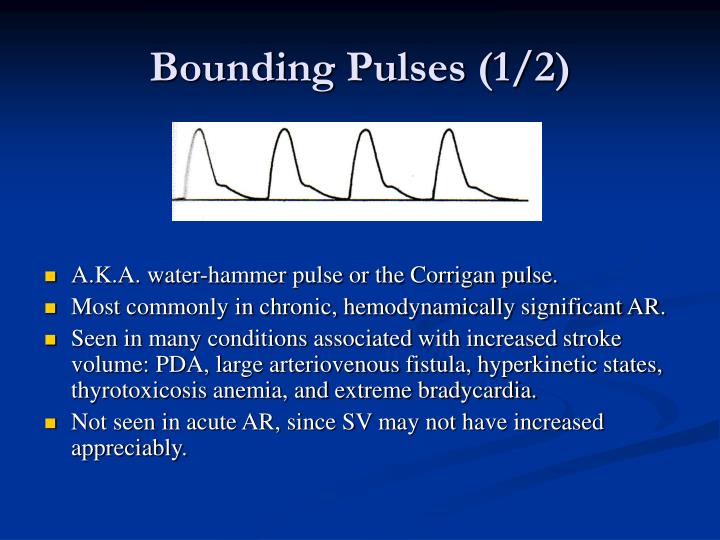Bounding pulse A pulse that reaches a higher intensity than normal, then disappears quickly. Best detected when the arm is held aloft. Pulse - bounding Bounding pulse. A bounding pulse is a strong throbbing felt over one of the arteries in the body. It is due to a forceful heartbeat. The pulse is the number of heartbeats per minute. Image Read Article Now Book Mark. Bounding Pulses explained.
A bounding pulse is often described as being an extremely strong or powerful pulse that feels as if your heart is pounding, but thankfully, it usually occurs only for a short period of time. A pulse is the heartbeat rate that can be felt at various points on your body, such as a bounding pulse in the neck, and represents arterial palpation of the heartbeat.
Blood found within our body serves to deliver oxygen and nutrients to every cell. It achieves this in part due to a balance of various pressures within our blood vessels that keep blood flowing through the circulatory system. While a transient bounding pulse is not much of a concern, having one appear regularly or should be brought to the attention of a medical professional.
Causes of bounding pulse
There are a variety of bounding pulse causes, with some being more worrisome than others. However, in many cases, the cause for a bounding pulse is never found and thought to be insignificant enough to resolve on its own. Other cases where a bounding pulse is sustained and pronounced can point to a serious underlying problem. The following are some causes of bounding pulses:

Being out of shape: One of the most common causes of a bounding pulse, as participating in strenuous activity forces the heart to work harder than it is used to, beating faster to circulate more blood.
Anxiety: A natural response to stress and is hallmarked by a person’s worry about future events. Anxiety often makes one experience a fast heart rate and shakiness.
Pregnancy: Often brings with it an increased need to urinate, tender breasts, fatigue, nausea, and changes in blood volume, which can cause bounding pulses.
Fever: Having a high fever can produce a bounding pulse.
Arrhythmia: Characterized by abnormal heart rhythms of the atria or ventricles, it can lead to the development of bounding pulses.
Heart failure: A bounding pulse can be the result of a heart that cannot pump out blood as effectively as it used to.
Anemia: Has several different causes but all essentially lead to insufficient delivery of oxygen to cellular tissue.
Hyperthyroidism: Caused by the excess production of thyroid hormone from the thyroid gland. Thyroid hormone affects our metabolism, with high levels possibly increasing heart rate.

Hypertension (High blood pressure): Generally considered a condition that presents with few or no symptoms, years of having high blood pressure can lead to the eventual development of other vascular conditions that can present with bounding pulses.
Digitalis toxicity: A medication used to treat various heart conditions, digitalis can lead to bounding pulses in cases of overdose. This is an emergency condition that requires immediate medical attention.
Other causes:
- Aortic regurgitation
- Patent ductus arteriosus
- Aortopulmonary window
- Aneurysm of sinus of Valsalva
- Cor pulmonale
- Beriberi
- Arteriovenous fistula
- Chronic alcoholism
Symptoms of bounding pulse
Your heart will begin to feel like it is beating faster and harder than normal. The sensation will also likely extend to the neck or through it, easily being felt by hand and possibly even being visible as pulsing veins under the skin. Your heartbeat may also feel irregular or feel like it misses a beat.
Diagnosis and treatment for bounding pulse
Knowing how bounding pulse occurs can allow your doctor to accurately narrow down the potential cause of your case of bounding pulse. Prior cardiovascular history in yourself or your family will also be of value for finding a bounding pulse treatment.
Various tests can be ordered to help provide more information about your case. For example, a blood test can look for thyroid hormone levels and an electrocardiogram (ECG) can be helpful for identifying any abnormal heart rhythms. Tests will vary depending on the suspected cause of bounding pulses suspected.

Bounding pulse treatment will often be to simply correct the underlying cause, but for the most part, treatment is unnecessary, as the condition tends to resolve on its own. However, in cases of hyperthyroidism or arrhythmia, specific treatments for each will be implemented to help control those conditions that should resolve a bounding pulse.
Cases of bounding pulse caused by anxiety or stress may be treated by avoiding triggers and substances like caffeine that may induce an increased heart rate.
When to see a doctor
Experiencing the following symptoms along with the symptoms of a bounding pulse should raise some concern and be brought to the attention of your local doctor. These additional symptoms may hint at a potential underlying condition that may not resolve on its own.
- Lightheadedness
- Difficulty breathing
- Fainting
- Confusion
- Abnormal sweating
While it is true that most cases of a bounding pulse go away after a few seconds, having a previous history of heart problems should also prompt a visit to your doctor.
Prevention of bounding pulse
Following treatment regimens as outlined by your doctor is an absolute must if diagnosed with a condition that predisposes you to develop a bounding pulse. This means taking all medications on time and visiting your doctor for regular checkups.

It is also recommended to lose weight if obese. Carrying extra weight can make it harder for your heart to pump blood through the increased body mass that has accumulated. Extra body mass also contributes to the development of high blood pressure, which is a possible cause of bounding pulses. The following are some recommendations for keeping body weight under control.
Bounding Brachial Pulse
- Take regular walks, as it is an easy exercise that can be done at nearly any fitness level.
- Get active by joining your local gym, where you can lift weight, use a treadmill, or ride an exercise bike.
- Performing household chores is a great way to burn calories and get your house looking great.
- Get active with others to keep motivated.
- Take some of your lunch time to go for a walk when at work.
While everyone experiences stress and anxiety from time to time, learning to reduce it can make a big difference. The following tips may help you reduce stress and anxiety
Bounding Pulse Definition
- Try to laugh and enjoy yourself more often.
- Spend time with people you are comfortable with, such as your friends and family.
- Getting better sleep can help improve mood and make you feel less anxious.
- Keeping a journal can be therapeutic as you write down your thoughts.
- Try not to worry so much about things out of your control.
- Limit the amount of coffee and energy drinks in your diet.
- Avoid drugs, especially ones that increase your heart rate.
Differential Diagnosis Of Bounding Pulse
Related: World heart day: Enlarged heart, diabetes and heart disease, fluid around the heart, massive heart attack

